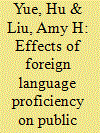|
|
|
Sort Order |
|
|
|
Items / Page
|
|
|
|
|
|
|
| Srl | Item |
| 1 |
ID:
171196


|
|
|
|
|
| Summary/Abstract |
What explains public attitudes towards a former aggressor state? Conventional wisdom would suggest the prevalence of negative sentiments rooted in historical hatred. In this article we contend that when individuals are proficient in a foreign language—e.g. a lingua franca—they have an alternative channel through which they are exposed to positive narratives put forth by other parties regarding the former aggressor state. And as a result, their attitudes towards the former aggressor state are more positive than those held by their linguistically limited counterparts. To test our argument, we focus on public attitudes towards the Japanese in Mainland China, Singapore, and Taiwan—three Chinese-ethnic majority political units that experienced Japanese aggression leading up to and during World War II. Using survey data, we demonstrate that individuals who are proficient in the English language are much more likely to hold positive attitudes of the Japanese. These results are robust even when we consider whether some individuals are predisposed to being cosmopolitan; whether some individuals have more opportunities to learn English; and whether the linguistic effects are symptomatic of American soft power.
|
|
|
|
|
|
|
|
|
|
|
|
|
|
|
|
| 2 |
ID:
171203


|
|
|
|
|
| Summary/Abstract |
What explains the passage of Thailand's landmark universal healthcare (UHC) policy? In separate contributions, Selway and Harris emphasized the role of electoral rules and political parties, on one hand, and “professional movements” of developmentally minded state bureaucrats on the other. Which is correct? In this article, Selway and Harris respond to each other's work. While Selway agrees that the actions of the professional movement constitute an underappreciated necessary condition for universal healthcare in Thailand, he argues that Harris overstates the role of the movement in implementation. Harris defends his position and maintains that an institution-focused account is insufficient, arguing that the actions of Thailand's Rural Doctors’ Movement not only explain universal healthcare but also gave rise to the very electoral rule changes that Selway argues were so critical to facilitating universal coverage. Selway responds to these criticisms, and the two researchers jointly consider implications for causation, qualitative research, and policymaking theory.
|
|
|
|
|
|
|
|
|
|
|
|
|
|
|
|
| 3 |
ID:
171200


|
|
|
|
|
| Summary/Abstract |
Since Korea's transition to democracy in 1987, Korean leaders have become increasingly confrontational toward Japan, with such steps ranging from verbal threats filled with hawkish rhetoric to material threats, such as displays of military force and threats of actually using it. To explain South Korean leaders’ hawkish approach to Japan, we build a theory of “prospective diversion” by combining insights from the diversionary theory of international conflict and prospect theory. We argue that foreign policy leaders have a strong tendency to overvalue political losses relative to comparable gains in their approval ratings. As a result, they are inclined to take risk-seeking diplomatic actions toward foreign adversary to avoid further losses. By conducting statistical analyses and developing case studies of Korean leaders’ confrontational policy decisions regarding Japan, we present empirical findings consistent with our hypothesis that Korean leaders are inclined to engage in prospective diversion toward Japan when they suffer domestic losses. This article provides an enhanced understanding of the domestic political foundation of South Korean leaders’ increasingly contentious attitude toward Japan.
|
|
|
|
|
|
|
|
|
|
|
|
|
|
|
|
| 4 |
ID:
171198


|
|
|
|
|
| Summary/Abstract |
Why do voters in single-party regimes express support for the ruling party in such large numbers? Scholars offer three sets of explanations: 1) Support is manipulated by regime leaders or falsified by frightened voters; 2) Support is due to genuine popularity or “performance legitimacy”; 3) The incumbent party holds an extreme incumbency advantage due to voters’ certainty about their candidates’ policy positions or access to state resources. Despite the impressive theoretical development in this literature, these arguments have not been subjected to a research design capable of examining the relative importance of each of these factors. We use a unique survey experiment on nearly 42,000 Vietnamese citizens over three years that reduces the threat of preference falsification and allows us to isolate voter's true preferences as much as possible. While we find some evidence for all three explanations, we find substantial support for incumbency bias. An important subset of Vietnamese voters—those inclined to vote for non-party candidates—sincerely favor the party under conditions of uncertainty about the candidates’ policy stances or experience in the legislature.
|
|
|
|
|
|
|
|
|
|
|
|
|
|
|
|
| 5 |
ID:
171202


|
|
|
|
|
| Summary/Abstract |
In this paper, we study how political parties react to democratic transitions. We find that the structure of legislators’ social networks plays a critical role in shaping their political interactions during the transition period, and consequently, the post-transition party systems that emerge. We focus on the Korean case, where the incumbent authoritarian party merged with one of its pro-democracy opponents to create a powerful and enduring conservative party under democratic rule. Using a novel individual-level dataset on all legislative members during the transition, we find that the merger was facilitated by dense social networks linking members of the merged parties, which increased trust across the parties and reduced the difficulty of a merger. Conversely, we find that the paucity of ties linking pro-democracy parties hindered their long-term cooperation, despite their shared ideologies and policy goals. The study complements existing theories by providing a network-based explanation for the weakly institutionalized political party system that has characterized Korean politics since democratization.
|
|
|
|
|
|
|
|
|
|
|
|
|
|
|
|
|
|
|
|
|